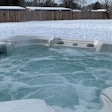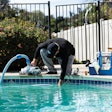
“This award program creates a legacy of learning, empowering future generations who strive to make the world a better place through action and giving back,” says Bill Kent, NSPF scholarship review committee chair. “Every person who has purchased an NSPF educational product or taken a CPO certification course has contributed to helping these young adults along the way in their professional development.”
The NSPF scholarships are open to direct family members of those who are CPO-certified. This year, $15,000 were awarded to 11 students, all of who are pursuing higher education around the U.S. As a part of the application process, each student is asked to write an essay in response to a specific question. This year, the question was, “What could be done in America to get more people to learn to swim?”
One application in particular impressed the NSPF committee. In response to the prompt, applicant Kayla Agan wrote, “The best way to influence the next generation is for each of us to share our knowledge with the next generation.” Agan recommended the slogan, “Each One, Teach One,” as a means of spreading that message.
In addition to scholarships, NSPF has a fellowship program established to encourage and provide assistance to graduate and post-doctoral research fellows who are researching subjects pertinent to the aquatics industry. This year, two doctoral were awarded $2,500 each:
Lori A. Sherlock will pursue her final year as a doctoral student in education with a minor in exercise physiology from the School of Medicine at West Virginia University. She has always been associated with aquatics and has a lifelong passion for the field of aquatics, with a career focus on the effects of aquatic exercise on cognitive function. The nationwide concern for cognitive decline, paired with potential outcomes derived by the aquatic environment, could add a new dimension for utilizing aquatic facilities. “With a nearly 50 percent dementia rate in adults age 85 and older, the research is sorely needed to help utilize study outcomes to present viable aquatic exercise options for cognitive and physical maintenance to promote a higher quality of life, reduced medical costs and minimization of independence loss,” she says.
Jacquelyn Nagle is entering her third year as a doctoral student in exercise physiology at University of Pittsburgh. Her program of study has allowed her to merge two passions — chronic disease prevention and aquatics. “In recent years, I have taken this passion for aquatics and turned it into a pursuit of science,” she wrote in her biographical sketch. Nagle is conducting research to investigate and document the positive health consequences of aquatic exercise against maladies such as high blood pressure, diabetes, obesity, heart disease, cancer, aging, physical therapy and arthritis. Her preliminary goal is to educate public health officials and swimming/aquatics agencies on the most appropriate and safe methods to assess participants, taking into account an individual’s health history and baseline level of fitness.
If you’re CPO-certified and have family members pursuing higher education, visit NSPF to learn more about how they can apply for next year’s scholarships.











































